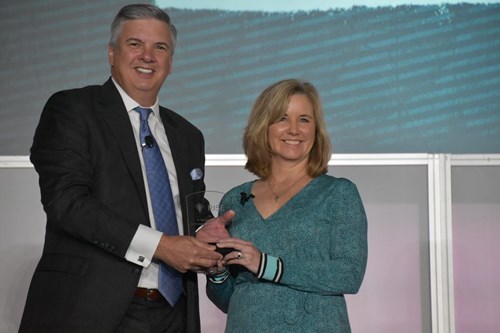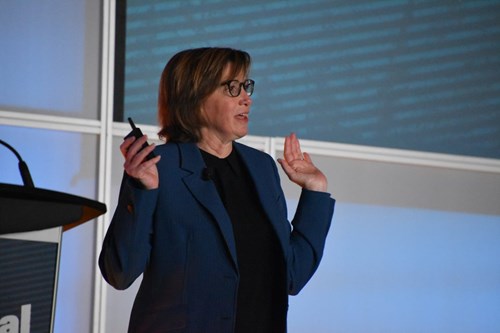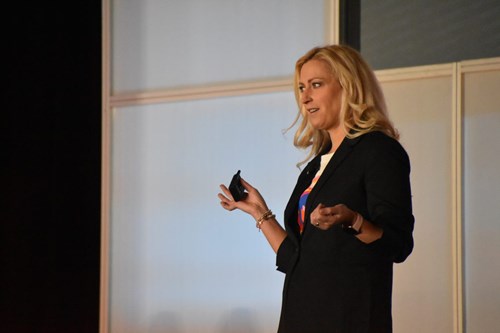What an incredible two days we’ve had at RISE National 2022!
The last full day of the conference started off with another round of speed-networking roundtable sessions, followed by the presentation of the prestigious Dr. Martin L Block Award for Innovation & Excellence. The annual award is given to an individual who has advanced the lives of America’s seniors through clinical leadership, policy vision, and by superior example of the RISE mission to promote continuous improvement in the health care system.
Our 2022 recipient: Tiffany Pankow, M.D., associate chief medical officer, HonorHealth Medical Group, who was nominated for the award for her work addressing food insecurity, screening patients for social determinants of health, and ensuring vaccine equity and roll out vaccination clinics at Black churches and community centers.

In her nomination, she was referred to as a “leader’s leader,” who has led several successful, innovative large scale system wide projects that impact millions of patients’ lives and hundreds of clinicians. Dr. Pankow was selected as our 2022 Block Award winner out of an impressive field of 13 nominees.
While accepting the award, Pankow said she was incredibly grateful and honored considering the legacy of Dr. Block. She accepted the award on behalf of the entire team of people at her organization who work together to help seniors. “It’s all about collaboration,” she said.
Congratulations to Dr. Pankow and all our nominees!

Next, we heard an amazing presentation from Keynote Dr. Nancy Messonnier, former director of the Centers for Disease Control and Prevention, who played a key role in ensuring an effective COVID-19 vaccine would be available to all Americans. Dr. Messonnier, who now serves as executive director for pandemic prevention and health systems at the Skoll Foundation, offered her insights into the pandemic, including the public health efforts that went well, those that didn’t, and what we need to do to be better prepared for the next pandemic.
“When I told the country in early 2020 to prepare for tough times, I didn’t fully understand how disruptive this would be,” Dr. Messonnier said. “I was thinking of it more like a dial instead of a switch that was flipped, and everyone panicked.”
She believes that the country is through the worst of the pandemic for now, but there will be mutations and COVID will be around again. The country must be ready to get back to living with it and be ready for the next wave. “But it should be a dial, not a switch,” she said.
As a society, we must recognize and accept that people have different levels of risk and different tolerance of risk, she said.
Dr. Messonnier outlined what she saw as failures, including insufficient preparation, management of fluctuating demand for supplies, regulatory bottlenecks, and insufficient education. “We did a terrible job in the beginning explaining why we didn’t want the public to buy masks,” she notes.
But she also emphasized the success of the vaccine development under Operation Warp Speed. The country did a good job of getting vaccinations into the arms of Americans, but it leveled off and it never got to the stage where it needed to be. It is difficult to design a vaccine implementation campaign in the middle of the pandemic, Dr. Messonnier said. However, the Centers for Disease Control and Prevention did a good job of planning the different stages of the campaign. Misinformation continues to be a big problem. For future outbreaks, she said the public needs a more consistent, common message so people don’t have to decide who they believe and who they don’t believe.

Future forecaster and game designer Jane McGonigal, Ph.D., then took the stage to explain the benefits of gaming to the health care industry. Games, she said, can be used to bounce back to life’s challenges with more energy and resilience. Her keynote presentation urged attendees to “imagine the unimaginable,” such as a health care future where games might be prescribed in greater amounts than traditional pharmaceuticals.
The opposite of work is depression, she said. When we play games, we feel a sense of optimism, confidence, curiosity, pride, and the desire to try again if we don’t succeed. It also makes it easier to relate to the people around us. People who have had a long day at work, can tap into a game, and suddenly feel more energized and elevated. McGonigal describes people who play games as “super-empowered hopeful individuals,” who can stay engaged with challenges, are resilient and can achieve their goals.
This empowerment doesn’t stop when they turn off the game. McGonigal said that research has shown the game transfer effect. When people play a game that is challenging to them for 10 minutes, and then turn their attention to a real-world task (such as something they’ve been putting off, a physical activity, or learning something new), they are more energized and focused. “We can learn to play with purpose, strategically in a relationship to our goals in our entire lives and what we want to accomplish,” she said. They can be a springboard to help people have more mental, physical, and emotional resilience to challenges.
Indeed, she said, recent research indicates that children who had a gaming habit before COVID fared better in terms of mental and social health during the first year of the pandemic and schools shut down. These children still were doing what they love to do and being with people in the same way as they used to. Parents of children also benefited because they started to learn the games and realize that it takes skill.
The average age of a gamer is 50, so McGonigal said we can expect to see gaming will be a consistent habit as we age. A large-scale survey of seniors found that they felt games increased their mental stimulation, helped fight dementia, helped them become more satisfied with life satisfaction, and maintain social connections.
In conclusion, McGonigal said it may not be as difficult to imagine a world where video games are prescribed to help improve our mental, physical, and emotional health. Games are not a replacement for prescriptions, she said, but they may be a pipeline for our health care.
We then broke into concurrent sessions before and after a networking lunch in the exhibit hall and joined for one last time at a closing roundtable where all track chairs discussed the conference’s main themes and expectations for a post-COVID health care landscape.
